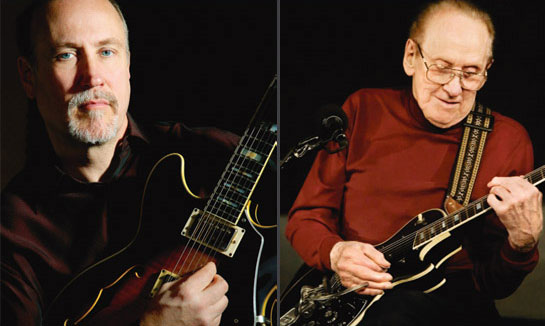
JOHN SCOFIELD
After graduating from Berklee, Scofield recorded with Gerry Mulligan and Chet Baker at Carnegie Hall, then played with the Billy Cobham-George Duke Band for two years. He went on to record with Charles Mingus and to join the Gary Burton Quartet. His live debut album appeared in 1977, followed by First and Rough House in 1978, Who’s Who in 1979 and Out Like a Light and Shinola in 1981. From 1982-1985, Scofield recorded and toured with Miles Davis, and this stint rocketed him to stardom on the international jazz scene, both as a player and as a composer.
Throughout the ’80s and ’90s, Scofield continued to record with his own groups and with others, collaborating with everyone from Pat Metheny and Bill Frisell (the other members of the “Big Three”) to such diverse names as Medeski Martin & Wood, Mavis Staples and Phil Lesh. Since his 1996 acoustic album, Quiet, Scofield has recorded with the Verve label. Of his offerings from this decade, 2001’s Works for Me featured a traditional jazz sound, while his 2002 and 2003 follow-ups, Uberjam and Up All Night, returned him to the fusion realm. His latest, Piety Street (see review in On the Record), digs deep into the gospel-soulfunk lore of New Orleans. Scofield took a similar approach on his 2005 Ray Charles tribute, That’s What I Say.
Scofield, who serves as an adjunct music professor at New York University, plays approximately 200 concerts each year and is currently on tour.
LES PAUL
Lester William Polsfuss was born in Waukesha, Wisconsin on June 9, 1915. At age eight, a ditch digger handed him a mouth harp and set in motion Paul’s musical career, and ultimately, the genre known as rock ‘n’ roll. His career began at age 13 with little formal training, and took him through a series of styles and musical partnerships, starting with his own blend of hillbilly-country, jazz flavored tunes when he was the 17-year-old known as “Rhubarb Red” for his bright hair. Rock’s path was set in 1941 when Paul invented the first solid body electric guitar.
Paul gigged around the Midwest at stage and radio venues until his early 20s. He arrived in New York in 1938 and hustled a regular gig with Fred Waring’s Pennsylvanians, which afforded Paul national exposure. In the following years he found his way to Hollywood to play with Nat “King” Cole and hooked up with Bing Crosby, who featured Paul’s trio on his radio show, sponsored his recording experiments and recorded six sides with him, including a 1945 Number One hit, “It’s Been a Long, Long Time.”
Later, the Les Paul Trio, which included his talented wife Mary Ford, produced such hits as “Tennessee Waltz,” “Mockin’ Bird Hill,” “How High The Moon,” and “Vaya Con Dios.” He also won a 1977 Grammy with Chet Atkins for the album Chester and Lester. Teamed with Ford, he recorded a string of successful pop songs in the 1950s, at one point boasting seven of the Top Ten singles. Paul’s fluid style featured rapid runs, fl uttered and repeated single notes and incorporated country and western licks and humorous crowd-pleasing effects. A bad car accident in 1948 required a break from playing and eventually an operation which left his right arm fixed at a permanent right angle to enable him to continue to play guitar.
An intense interest in technological innovation led Paul to construct a solid body electric guitar in 1941 known as “the log,” evolving into Gibson’s now-famous Les Paul guitar, which became one of the most popular guitars in rock ‘n’ roll in the late ’60s. His many other recording innovations—including sound-on-sound, overdubbing, reverb effects and multitracking—greatly accelerated the advancement of studio recording.
Eight decades since his debut, the beloved nonagenarian still records, invents, and performs every Monday night at the Iridium Jazz Club in Manhattan, which typically has lines around the block.
![]()
Elmore: What are you listening to right now?
John Scofield: I’m not listening as much as I used to. There’s this Internet thing where you put in an artist’s name, and you find all these related things. I started going off into doo wop land, which was a whole other world. That’s what I’ve been listening to for the last couple days, the Orioles, real ’50s doo wop. Maybe it’s an overlooked era.
Les Paul: The most well-written, well-produced, well-recorded records. For instance, with Diana Krall, I want to listen to how they mic the piano to get the almost perfect sound. Next, the performance of that song very well done, very tasty—the introduction is correct, the way they do the number is correct, and I’m very satisfied in what I hear. The mixer who mixed the thing is not happy because there’s a drum in there, and I want to hear it. But maybe it shouldn’t be heard. If you’re recording in the studio, you hear the person live. You walk into the control room and you’ve got two speakers, you hear anything but what you heard live. On the other hand, maybe you don’t care about ANY of that, it’s the message that you want from that record, and you say, “I love that because of the way he played this song.” It’s like going to a lecture, and hearing what the fellow says, but not the quality of his voice. Sometimes you listen to standards, a song that you recognize, and you can be very pleased on hearing it the second or third time, versus something that was new, that if you never heard it again, it was too soon.
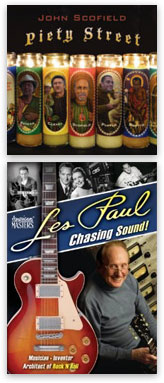 EM: What was the first record you ever bought?
EM: What was the first record you ever bought?
JS: “Little GTO,” the Rip Chords, when I was 10 years old, but I’m not proud of that.
LP: I was about 8 years old. A record with Bing Crosby and Eddie Lang, a very fine guitar player in Philadelphia who died at 34. Eddie Lang was the finest guitarist, when there were only maybe two or three in the world, not like today, when you’re stumbling over guitar players just to get to your act.
EM: Where do you buy your music?
JS: I download stuff on the Internet because of the ease, but I prefer CDs sonically. I still am in an album head, and download albums—I very rarely download one song because usually it’s jazz, and I want to hear everything the guy did on the record.
LP: Online, or people give it to me. That’s where I get my material. Mary and I had so many hits because I would pick a song that everybody knew. Miles Davis and Stan Kenton asked, “How come you have nothing but hits, and we’re very fine musicians and we work hard but don’t?” I said, “There’s a difference in the music you play.” Stan said, “I’m put on this earth to teach people how to appreciate good music and understand it,” and Miles Davis said, “I wouldn’t be caught dead playing the song the way it was written.” In both cases, my argument was, when people come to hear me, I give them what they wish. I go out of my way to make sure that the person who paid to get in gets his money’s worth.
EM: What was the first instrument you played?
JS: Guitar. I messed around. I have a set of drums and a bass and keyboard in my house.
LP: The harmonica. I played the piano, but I had my back turned to the audience. I played the saxophone, but then I had something in my mouth and couldn’t sing. Picking the guitar was very similar to a physician because what he does is a process of elimination. You don’t have this, you don’t have that, and it leads him to the things you do have.
EM: What brought you to the instrument you now play?
JS: Watching either Elvis or Ricky Nelson from early childhood, and thinking guitar was a cool thing. When I was 11, my mother said “Why don’t you play guitar like all those kids on TV do?” I said, “Great!” and she rented me an acoustic guitar to see if I would stick with it, and within a few months I bought my first electric guitar. I went right for electric, because that’s what I wanted. Girls had something to do with it. I wanted to be somebody, and I didn’t have to worry about my standing in Little League any more. The other guys thought, “Well, he plays guitar; he can’t play baseball, but that’s OK.”
LP: It was a process of eliminating every instrument you could think of. The number one instrument in the world was the piano, and you can’t put the piano in the backseat of the car and take it to the beach, and you don’t caress a piano. You can make love with a guitar. I got a very apologetic instrument, however, that could not stand up in the band against its competition, which would be a trumpet or a drum or a trombone, a piano, a bass. It was a weakling, it was a wimp, it just didn’t have the authority. As soon as I amplified the guitar, I was no longer a wimp, I was king, because I could turn it up as loud as they could get, or louder. I ruled the roost. That’s what’s made today’s music the way it is. Rock ‘n’ roll today is based on that.

EM: Who would you like to write with that you haven’t?
JS: I usually write by myself. I’ve played with a bunch of jazz musicians, some of the greats, and I consider that a form of composition, improvising together. With the allstar thing you get to play a couple of times in a highpressure situation, but I really enjoy the collaborations when we work on projects with lesser-knowns. It’s more rewarding to have a band to work with for a year. An improvisational situation is like writing. You’re being creative together, making stuff up at the same time and feeding off each other’s stuff. It’s really similar.
LP: A lot of them aren’t with us any more, unfortunately, like Gershwin, Porter. A lot of great writers may have only written one song in their life, but it happens to be the right song with the right message.
EM: What musician influenced you most?
JS: Personally, Miles Davis. The Beatles came on The Ed Sullivan Show February ’64, and I had gotten my guitar the previous September, so the Beatles for sure.
LP: Eddie Lang was the first. Segovia dug deep into music theory and music playing. He knew his instrument, and how to get the most of it. I learned from the very best.
A person like Segovia has done much of your thinking for you. You learn from mentors, the people way ahead of you. Segovia, Gene Autry, Art Tatum, I was helped by the greatest. I surrounded myself with the people I was in awe of.
EM: What was the song or event that made you realize you wanted to be in music?
JS: After I played at a dance and people liked me. I was probably about 13. Being young and dumb, from a middle-class suburb and not really having a finger on reality, I was ready to have a meager income my whole life. I just wanted to be on the scene. I never thought, “Wow, this is a shitty way to make a living!” I just wanted to be involved and be part of the music world, and who cares? I was always fascinated by music, and music always has been my solace.
LP: From the beginning. In school, I would play for the Lions Club, standing on a table, and they’d hand me $10. My brother drove a truck, and my dad was lucky to make $20-25 a week, and here I was eight, nine, ten years old, a little snot-nosed kid making more money than they were, on my lunch hour. I would never sleep, and I was ALWAYS doing jobs, so I was making more money than anyone in my family. I sold newspapers, but at the same time I was building a crystal set. Immediately I began to have a new source to listen to. I was already hooked on sound and fidelity. I’m trying to make a hearing aid. I was up all night last night, working on it. There are people probably listening to a Les Paul guitar and damaging their ears by turning the guitar up too loud. (Laughs) I give them a gun so they can shoot themselves.
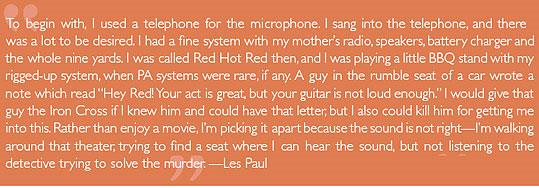
EM: Who would you like in your jazz heaven band?
JS: First of all, I wouldn’t play in the band, I would just listen. Melvin Jones on drums, Charles Mingus on bass, Bud Powell on keyboard, Paul Desmond on alto sax. I don’t hear a guitar in here—it’s already too busy. First, I’d just want to listen, but if somebody said Isn’t that John Scofield in the audience? I’d be up there in a heartbeat. I’d have a good day.
LP: Buddy Rich is probably the finest drummer who ever lived. Then you’re going to hear a lot of drums. Among the great saxophone players, Coleman Hawkins. On trumpet, Louis Armstrong—that’s who I started with, who I learned from and was close to. Jack Teagarden was a great trombone player, there were others who were more technical, and much finer, but it depends on where and how he is used. You can have Art Tatum on the piano, but God help you, because you’ll be overridden with so many notes, too much. I’d have Eddie Lang playing guitar, and I’d be copying him. He was light years ahead of me.
Play the right thing, and put it in the right place. If there’s a hole, some people have to put something in it, but others say, “Right here, nothing is as precious as something.” Bing Crosby said to me one day, and I never forgot it, “We’re a little busy, aren’t we?” He just told me I was playing too much. Those are precious words.
The people who I would pick would get along with each other, would listen to one another, and could control their egos. When we have a guest, whether it’s Paul McCartney or a young kid beginning, he’s the star. He is the picture, and you are the frame around him.
EM: What’s your desert island CD?
JS: My desert Island CD would change every day. Today, Miles Davis with Gil Evans, Porgy and Bess. They really changed it, and what they did I like more than the original.
LP: I don’t know how I can get my best gal on a CD.


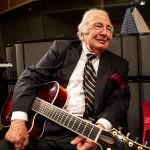

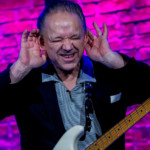

Be the first to comment!